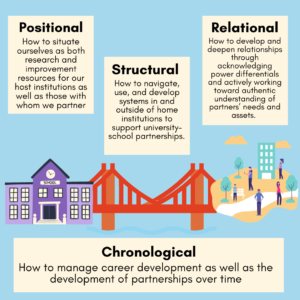“Will you be here in three years?”: New Frameworks to Support University-School Partnership Improvement Hubs
By Kristen C. Wilcox (University at Albany, SUNY) & Sarah J. Zuckerman (University of Nebraska-Lincoln)
“Will you be here in three years?”
I was asked this question recently when facilitating a conversation with improvement team members in one of NYKids’ COMPASS partnership schools and it gave me pause. How can university-school improvement hubs and hub leaders develop and maintain relationships with their K-12 school partners over time? What are the facilitators and barriers for university-school partnerships to continually support mutual learning across the educational pipeline?
 The University Council for Educational Administration (UCEA) 2022 conference was held November 17-22nd, and NYKids was delighted to have an opportunity to share insights on what we have learned from a dozen years of school improvement work via our COMPASS partnership model. The conceptual paper was co-authored with University at Albany Educational Policy and Leadership alum Dr. Sarah J. Zuckerman, co-lead of Nebraska CARES, from the University of Nebraska-Lincoln.
The University Council for Educational Administration (UCEA) 2022 conference was held November 17-22nd, and NYKids was delighted to have an opportunity to share insights on what we have learned from a dozen years of school improvement work via our COMPASS partnership model. The conceptual paper was co-authored with University at Albany Educational Policy and Leadership alum Dr. Sarah J. Zuckerman, co-lead of Nebraska CARES, from the University of Nebraska-Lincoln.
As Sarah and I explored in our UCEA paper, while a growing number of school improvers and improvement scholars have generated knowledge and expertise about improvement – and there is reason for hope that the education sector as a whole can “get better at getting better” through the use of a growing body of improvement research in education scholarship— how university-school improvement hubs and those who lead them can be developed and sustained to support continuous improvements remains opaque.
Paradigm Shifts for University-School Improvement Hub Leader and Hub Development
As we describe in a brief of our UCEA paper, paradigm shifts are needed in at least three areas:
- how university-based researchers conceptualize the intended purpose and outcomes of their research (on a continuum from controlled experiments to participatory iterative designs)
- how policymakers, school and district leaders, practicing professionals, researchers, and improvement specialists conceptualize problem and solution identification (on a continuum from a purely technical focus to a relational focus)
- how school and district leaders, practicing professionals, researchers, and improvement specialists conceptualize the process of improvement (on a continuum from short “projects” to long term mutually-beneficial partnerships)
 In our paper we share an emergent framework fleshing these considerations out for the purpose of surfacing where some of the challenges and opportunities lie in answering such questions as “Will you be here in three years?”.
In our paper we share an emergent framework fleshing these considerations out for the purpose of surfacing where some of the challenges and opportunities lie in answering such questions as “Will you be here in three years?”.
We believe attention to these considerations have been under-examined and under-theorized, hampering the abilities of university-school improvement hubs and those who lead them from putting their full force into addressing some of the most pressing problems in schools today.
Our intention in offering this emergent framework is to engage in the simultaneous renewal of colleges of education and K-12 schools as is needed more than ever before.
To see more on this framework, check out the brief here.
Thank you for your interest in NYKids! We invite you to follow us on Twitter, Instagram, or Facebook, for announcements and encourage you to reach out to nykids@albany.edu if you have any questions, feedback, or interest in continuous improvement support.
